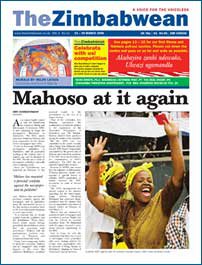The Zimbabwean Media hangman takes aim
We are not surprised by chairman Tafataona Mahoso's announcement that he has recommended to the government that his media and information commission (MIC) be allowed to extend its grip on media freedom in Zimbabwe by regulating newspaper distributors, as well as publishers and journalists.

We believe this proposal is aimed specifically at The Zimbabwean, which has been a thorn in his side ever since it was launched on 11 February 2005. He has made his feelings well known through his abuse of the state-controlled media, where he spews venom week after week against any form of freedom of the press.
Even the Zimbabwean courts have had to admit that Mahoso cannot be trusted to judge fairly when it comes to freedom of expression. This was proved conclusively by the recent Associated Newspapers of Zimbabwe (ANZ) case, in which judge Rita Makarau (on 9 February) forbade Mahoso's commission from having anything to do with the ANZ's application for a licence to re-commence publication of the Daily News and the Daily News on Sunday.
Zimbabwe's diabolical Access to Information and Protection of Privacy Act (AIPPA) gives Mahoso almost unlimited power to decide on the fate of individual newspapers and journalists within the country. But it does not extend yet to foreign publishers.
As a foreign news publication, therefore, we do not have to ask Mahoso for permission to publish The Zimbabwean. Nor do we have to put up with his interference, his censorship, nor publish his screeds of incoherent vitriol, as local newspapers are forced to do.
This has obviously frustrated the destroyer of independent newspapers to the point where he can no longer accept the situation. Hence his proposals to government to extend his powers to encompass local distributors, under the spurious conjecture that foreigners might use "unknown distributors to circulate material hostile to the government on the eve of a major election".
Mahoso's behaviour regarding the media is also notoriously inconsistent. For example, he closed down the Tribune and its sister newspaper the Weekend Tribune, on the ground that they did not inform him of a change of ownership. Meanwhile, the Financial Gazette changed hands early this year, when it was taken over by the Central Intelligence Organisation. Mahoso's silence, in deference to the men in dark glasses, was deafening!
A correspondent, Harare Tafataona Mahoso's tricks
As it cannot legally control or ban The Zimbabwean, the notorious media and information commission (MIC) is now planning to target our distributor in Zimbabwe. The MIC, under chairman Tafataona Mahoso, has been responsible for the closure of five newspapers since 2003.
Under its draconian AIPPA rules, newspapers published in Zimbabwe and all journalists working in the country have to register, pay and be licensed by the MIC. But the law is silent on newspapers published externally and circulating locally.
Since The Zimbabwean was launched on 11 February 2005, Mahoso has mounted a personal vendetta against the newspaper and its publisher, using his unrestricted access to the state media to denounce them in the most intemperate language at every opportunity.
"It is essential that we should regulate both the publishers and the distributors. Those distributors which import foreign periodicals should indicate where they are procuring such periodicals," Mahoso told the parliamentary portfolio committee on transport and communications this week.
Using scare-mongering tactics to alarm the committee, Mahoso said he "imagined" what would happen in the event that unknown distributors circulated material hostile to the government on the eve of a major election.
Committee chairman Leo Mugabe questioned the commission's position in relation to the registration of the Associated Newspapers of Zimbabwe and the Tribune. Mahoso ducked both questions, saying the matters were sub judice.
But the ANZ case was concluded in the courts recently when judge Rita Makarau ruled that the MIC board's impartiality was tainted by the proven bias of Mahoso, and barred all members of the panel from involvement in the consideration of ANZ's application. The MIC has not appealed against this decision.
In terms of AIPPA, this means that the minister of information, Tichaona Jokonya, should now appoint a special board to consider ANZ's application, or simply instruct the MIC secretariat to issue a licence.
The ANZ management has already written to Jokonya, asking for his intervention. Legal adviser Mordecai Mahlangu has expressed disappointment that the minister had not yet responded to the letters of appeal, written on 22 February and 13 March.
Mahoso has also misused his position to hold newspapers and journalists to ransom. Earlier this year, he refused to accredit journalists from the Independent until the paper retracted a story about internal squabbling in the MIC.
True to form, he told the commission that there was a need to investigate local journalists who were writing articles for foreign news organisations that he accused of being "hostile to Zimbabwe", singling out Voice of America for special mention.
Read more
Get our weekly email
Comments
We encourage anyone to comment, please consult the oD commenting guidelines if you have any questions.